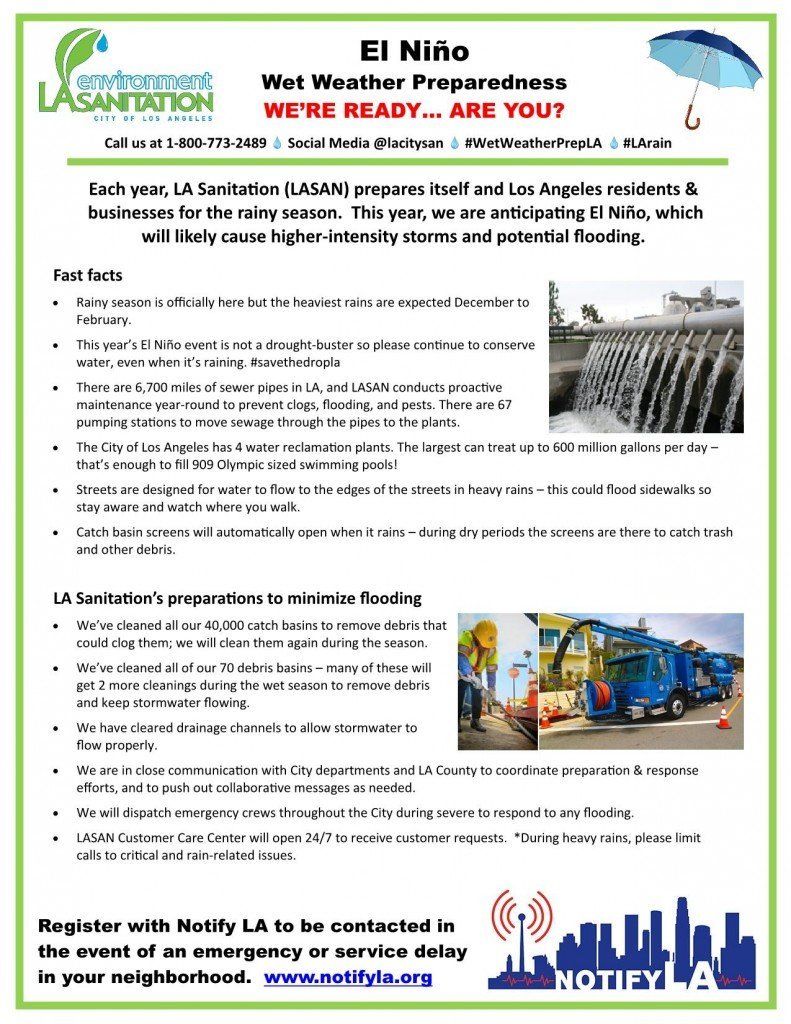Each year, LA Sanitation (LASAN) prepares itself and Los Angeles residents and businesses for the rainy season. This year, we are anticipating El Niño, which will likely cause higher-intensity storms and potential flooding.
What can residents and businesses do to prepare?
- Check your catch basins to make sure theyare clear of debris. Call us at 311 or 1-800-773-2489 for assistance with debris removal.
- Ensure your building drainage is clear of debris, including rain gutters.
- Secure any loose palm fronds, tarps, loose items that may be carried away by rain or be blown away.
- Cover steep slopes on your property that are not vegetated, which may become unstable when saturated by rain.
- Use sand bags to protect properties in low lying areas. Contact your neighborhood fire station for sandbags.
- Have alternate evacuation routes out of your neighborhood.
- If you have sprinklers, turn them off before, during and after rain.
- Install rain barrels to capture rain. LADWP provides rebates for up to 4 rain barrels per property.
- Please reduce water consumption during rain to reduce flows in our sewers.
- Create an emergency kit including the following items:
- Food and water to last three days to a week. (extra for pets)
- First aid kit & medications (over-the-counter and prescription)
- Radio (with extra batteries)
- Cash and important documents
- Blankets, clothing and sturdy shoes
- Tools (wrench, duct tape, fire extinguisher, sturdy gloves, whistle)
- Sanitation and hygiene supplies
Fast facts
- Rainy season is officially here but the heaviest rains are expected December to February.
- This year’s El Niño event is not a drought-buster so please continue to conserve water, even when it’s raining. #savethedropla
- There are 6,700 miles of sewer pipes in LA, and LASAN conducts proactive maintenance year-round to prevent clogs, flooding, and pests. There are 67 pumping stations to move sewage through the pipes to the plants.
- The City of Los Angeles has 4 water reclamation plants. The largest can treat up to 600 million gallons per day – that’s enough to fill 909 Olympic sized swimming pools!
- Streets are designed for water to flow to the edges of the streets in heavy rains – this could flood sidewalks so stay aware and watch where you walk.
- Catch basin screens will automatically open when it rains – during dry periods the screens are there to catch trash and other debris.
LA Sanitation’s preparations to minimize flooding
- We’ve cleaned all our 40,000 catch basins to remove debris that could clog them; we will clean them again during the season.
- We’ve cleaned all of our 70 debris basins – many of these will get 2 more cleanings during the wet season to remove debris and keep stormwater flowing.
- We have cleared drainage channels to allow stormwater to flow properly.
- We are in close communication with City departments and LA County to coordinate preparation & response efforts, and to push out collaborative messages as needed.
- We will dispatch emergency crews throughout the City during severe to respond to any flooding.
- LASAN Customer Care Center will open 24/7 to receive customer requests. *During heavy rains, please limit calls to critical and rain-related issues.
Register with Notify LA to be contacted in the event of an emergency or service delay in your neighborhood. www.notifyla.org
What residents should do during the rain?
- Monitor radio and TV news closely for information about weather conditions, flooding in your area and safety precautions being advised.
- Be aware of notifications of suspended trash service in your area. Don’t leave trash containers out during those conditions as they may tip over and clog storm drains & catch basins.
- Be prepared to leave immediately if an evacuation is ordered.
- Stay away from flood channels & flowing rivers. You could be knocked off your feet in as little as 6 inches of water.
- Don’t try to cross flooded areas and never enter moving water. Turn around - don’t drown.
- If your home has been flooded, protect your family’s health by cleaning up right away. Throw away food and medications that may have been contaminated.
- Stay away from steep slopes that may become unstable when saturated by rain.
- Never touch a downed power line, which can cause serious injury or death. Call 9-1-1 to report it.
- Look out for tilted trees, telephone poles, fences or walls, and for new holes or bare spots on hillsides.
- If trapped in your vehicle, stay with it. If possible, relocate to the hood if water continues to rise.
- Be alert when driving. Roads may become blocked or closed due to hazards.
- Report small problems as soon as they occur, before they turn into bigger problems.

